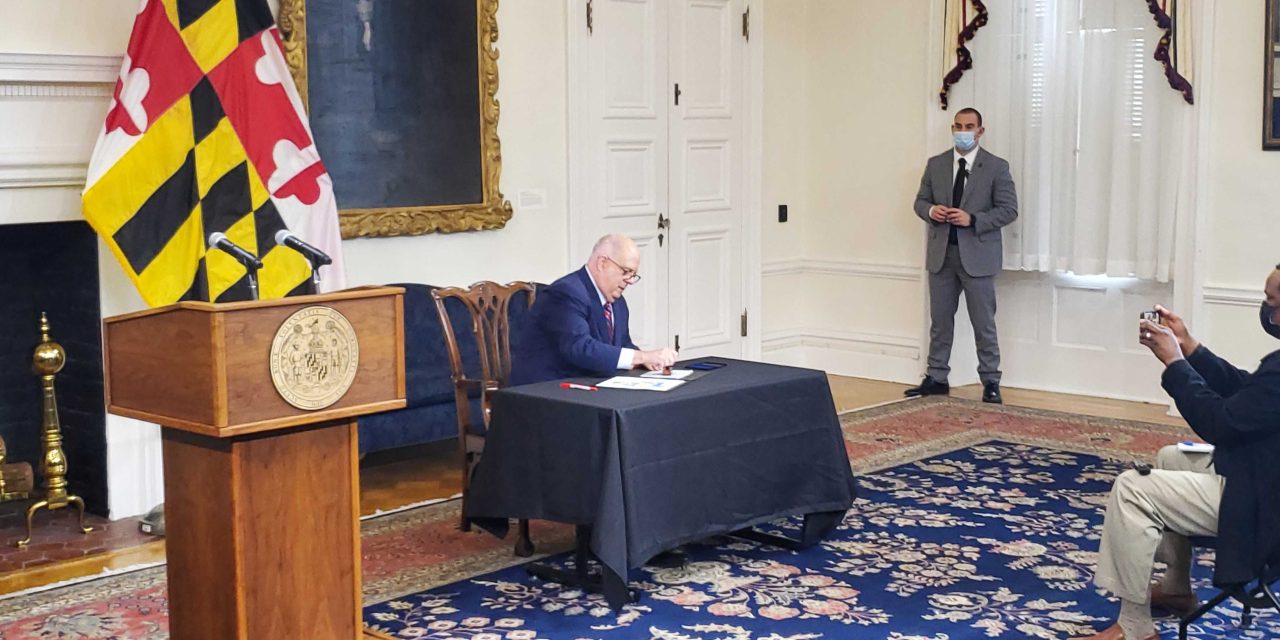State GOP lawmaker: Gerrymandering in Texas does not excuse further gerrymandering in Maryland
A decision by Texas Republicans to further gerrymander that state’s congressional districts does not make it ok for Maryland Democrats to move forward with an arguably similar proposal in Annapolis, House Minority Leader Jason Buckel said earlier this week.
“Maryland is already one of the most gerrymandered states in America,” Buckel, an Allegany County Republican, told Baltimore Post-Examiner.

“The lowest performing Republican candidates in modern Maryland history typically get at least a third of the vote. And yet our congressional districts are 7 t0 1. They have been intentionally gerrymandered multiple times over the last two redistricting cycles to basically eliminate Republican voices to the greatest extent possible.”
Del. David Moon, a Montgomery County Democrat, who is majority leader in the House of Delegates, has announced plans to file legislation that would allow the legislature to redraw the state’s congressional districts outside of the normative 10-year census redistricting cycle if other states decide to do the same.
“I have come to the conclusion that mid-decade redistricting is an all-or-nothing game,” Moon said. “All fifty states either redistrict Congress whenever they want, or none of them do. It makes absolutely no sense for one state to break from the norms and decide it will redistrict whenever it wants.”
Moon also has announced plans to introduce legislation that would create a treaty among states to limit redistricting to once every decade. It would need to be ratified by all 50 states in order to take effect.

“My hope is that Maryland could be the first state to adopt this treaty and send it off into the world to the other 49 states so that there is something that all of the states can be pushing toward that is a positive common sense solution to the obvious question of whether states should only redistrict Congress once a decade — or whenever they want.”
Moon said that the bills are in the early stages of being drafted.
In Maryland’s upper chamber, Senate President Bill Ferguson has suggested it is possible that redistricting could be considered during the next legislative session, which begins next January.
A national battle that began in Texas
Moon’s proposal followed a move by the Republican-led Texas legislature to initiate plans to further reduce the number of Democratic congressional districts in the reliably red Lone Star State. The legislature acted at the request of President Donald Trump.
The move prompted the minority party to stage a walkout in Austin, under the threat of arrest. Some lawmakers have even gone to other states.
Democrats hope to deprive Republicans of a legislative quorum, which is necessary for official business to proceed.
The Texas Senate has already approved the plan.
Those events have led to what pundits are referring to as national “gerrymandering wars,” in which multiple states are threatening to redraw their congressional districts to benefit the party that is already firmly entrenched in power.
Among the other states threatening off-cycle redistricting are the Democratic strongholds of New York and California.
Reliably Republican states such as Florida, Ohio and Missouri are also reportedly considering following in Texas’ footsteps.
Redistricting in deep-blue Maryland
Maryland last redrew its congressional districts in April 2022.
A few months earlier, at a special legislative session, the General Assembly approved a map that many pundits said could have made the state’s congressional districts run 8 to 0 — meaning the sole Republican in the delegation, Rep. Andy Harris, might have lost his seat.
Then-Gov. Larry Hogan, a Republican, swiftly vetoed the plan and the legislature overrode the veto.
Hogan proceeded to challenge the map in court and ultimately, the legislature was forced to come up a slightly less partisan map that maintained the 7 to 1 status quo but made two of the state’s congressional districts a little bit more competitive than they had been.
Buckel said if Moon’s proposal were ever adopted, it might face the same legal hurdles as the map that the court invalidated.
“Even if they (Democrats) wanted to do it, I don’t know if they could do it in an effective way. I just don’t think that there is a legally permissible map out there that exists in which you could create 8-0 Democratic congressional representation…I think that is kind of a bad idea.”
State of play in the U.S. House of Representatives
Republicans have a narrow 7-seat majority in the lower chamber in Washington. And both parties are understandably nervous about what the balance of power might look like following next year’s midterm elections.
Congress has the authority to settle the redistricting dispute. But such action appears rather unlikely in the current hyper-partisan atmosphere in the nation’s capital.
Rep. Kevin Kiley (R-Calif.) recently introduced a bill that would prohibit mid-decade redistricting. But it does not appear to have the support of House Speaker Mike Johnson (R-La.).
“I wish nobody gerrymandered,” Buckel said. “I think the best solution is independent redistricting commissions.”
Moon said Democrats are not to blame for gerrymandering.
“People say two wrongs don’t make a right. Every parent teaches that to their child. That is true. But I think parents can also see a playground fight and know exactly when someone is being bullied. And that is also what is going on here. I think the public understands that that is what is going on and by and large is going to support the leaders of the assembly and the governor in whatever decision they come to.”
Buckel said he has concerns about mid-cycle redistricting.
“I don’t think its probably the best idea. But I am not a Texas legislator. I am not sure exactly what is going through the minds of Texas’ leaders. I know that they are gaining substantially in population. They may be saying to themselves: ‘Hey! We have a lot more people. We probably need to or could redistrict. And if we were allowed to, we would probably gain seats.'” Maryland might lose seats in the middle of this redistricting stream because we are just not gaining people here.”
What should be done about gerrymandering?
“I don’t want any state to redistrict in the middle of the decade unless they are under expressed court order to do so because of some violation of Voting Rights Act provisions, like the insufficiency of majority-minority districts,” said Thomas Schaller, a professor of political science at the University of Maryland Baltimore County (UMBC).
Schaller noted that Texas previously engaged in mid-cycle redistricting about two decades ago.
“Texas has set the precedent here. It is a bad precedent. They are doing it again. And this will basically mean that anytime a state’s partisanship changes hands or the governor changes hands — and they are not happy with the maps — states will start carving up the maps in the middle of the decade. And it’s a dangerous precedent all around.”
But Schaller said he understands why Democratic-led states feel the need to respond to what is happening in Texas.
“I don’t think California and Maryland should do this. But I also don’t think that Democratic-run states should allow themselves to unilaterally disarm if Republican states are going to do it.”

Bryan is an award-winning political journalist who has extensive experience covering Congress and Maryland state government. His work includes coverage of the election of Donald Trump, the confirmation hearings of Supreme Court Justice Brett Kavanaugh and attorneys general William Barr and Jeff Sessions-as well as that of the Maryland General Assembly, Gov. Larry Hogan, and the COVID-19 pandemic.
Bryan has broken stories involving athletic and sexual assault scandals with the Baltimore Post-Examiner.
His original UMBC investigation gained international attention, was featured in People Magazine and he was interviewed by ABC’s “Good Morning America” and local radio stations. Bryan broke subsequent stories documenting UMBC’s omission of a sexual assault on their daily crime log and a federal investigation related to the university’s handling of an alleged sexual assault.


The most egregious example of gerrymandering is happening in Leftist paradise Portland, OR. Funny how the esteemed Mr. Schaller refuses to mention that.